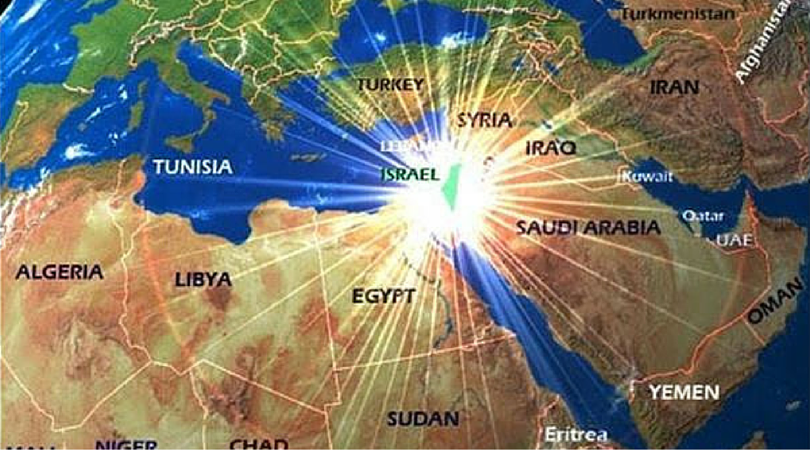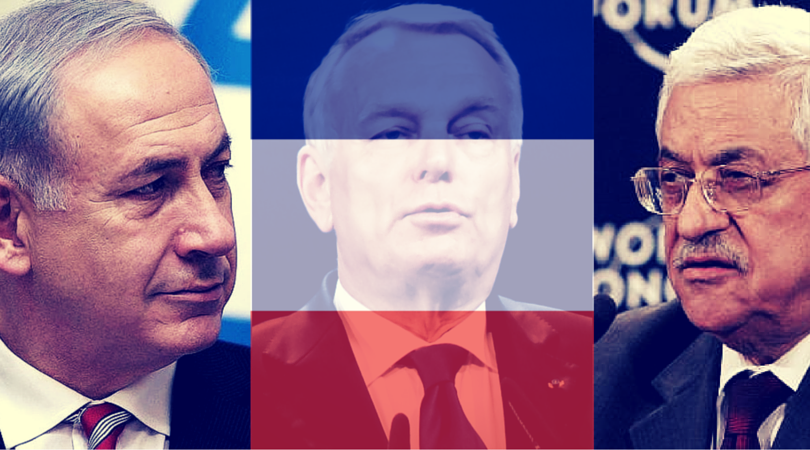“Alchemy: a seemingly magical process of transformation, creation” (The Oxford Dictionary).
“I do not think there is a Palestinian nation at all. I think there is an Arab nation. I think it’s a colonialist invention — a Palestinian nation. When were there any Palestinians? Where did they come from? I think there is an Arab nation.” (Azmi Bashara, Channel 2, 1996).
“The Palestinian people are an integral part of the Arab nation. … The Palestinian people believe in Arab unity. In order to contribute their share toward the attainment of that objective, however, they must, at the present stage of their struggle, safeguard their Palestinian identity and develop their consciousness of that identity” (The Palestinian National Charter).
As the end of May draws closer so does the prospect of a French convened international summit, aimed at “relaunching the Israeli-Palestinian peace process.” Inevitably, efforts will be focused on reviving the relevance of the two-state paradigm, after a long — and well-deserved — period in “cold storage.”
Plausible perils
Indeed, perhaps the most puzzling conundrum regarding the discourse on the Middle East conflict is the enduring centrality of an idea that has so little to support it, either in terms of its empirical record or its conceptual plausibility.
After all, as Israel’s newly appointed consul general in New York, Dani Dayan wrote some time ago in a New York Times opinion piece: “The insertion of an independent Palestinian state between Israel and Jordan would be a recipe for disaster. … The new state [would become] a hotbed of extremism. … Any peace agreement would collapse. … Israel would then be forced to recapture the area.”
This is hardly an improbable scenario, given the precedent of previous Israeli withdrawals. Indeed, every time Israel has evacuated territory it has become a platform from which to launch lethal attacks against it — whether in Gaza, Lebanon or Sinai, where an assorted collection of jihadi extremists are ever-tightening their grip over the peninsula.
Clearly, in the absence of compelling evidence to the contrary, there is no reason — other than unsubstantiated hope and unfounded optimism — that a similar fate would not — sooner or later — befall the “West Bank,” were the IDF to evacuate it.
The question then arises: Why would any rational person embrace a policy that so clearly threatens to wreak tragedy on Israelis and Palestinians alike?
Transparent trickery
In the course of modern history mankind has not infrequently been afflicted by political perspectives and policy prescriptions that were manifestly misguided, and by doctrinal dogmas that were demonstrably disastrous. Few, however, have been as transparent in their undisguised trickery as what has, perversely, become known as the “two-state-solution” (or TSS).
Based on the flawed and failed notion of land-for-peace, whose validity has repeatedly been disproven, but somehow never discredited and certainly never discarded, it has, for decades, inexplicably monopolized the debate on the Israel-Arab conflict in general, and the Israel-Palestinian conflict in particular.
What makes the dominance of the TSS-approach so difficult to fathom, is not only that it is anchored neither to empirical fact nor to logical consistency, but that the Arabs openly admit that it is nothing but subterfuge.
This assertion cannot be dismissed as some radical right-wing rant. It is the unavoidable conclusion that emerges from the deeds, declarations and documents of the Palestinians.
Nationhood as alchemy
To understand how unmoored the TSS-approach is from both fact and logic, consider how devoid of substance the key elements, which allegedly underpin it, are — such as the “Palestinian nation” and “Palestinian homeland.”
To illustrate this seemingly far-reaching assertion, suppose for a moment that the Arabs had not initiated the war of annihilation against Israel in 1967. Who then would have been the Palestinians? More important, what would have been Palestine?
After all, at the time, the Arab Palestinians resident in the “West Bank” were not stateless. Until 1988, all were Jordanian citizens.
Moreover, the 1964 version of the Palestinian National Charter (Article 24) explicitly proclaimed, not only that the “West Bank” was not part of the Palestinian homeland, but that it was part of the Hashemite Kingdom of Jordan.
So, had the Arabs not initiated a war of annihilation against Israel, the Arab residents of the “West Bank” would have been Jordanians, and the territory of the “West Bank” would have been Jordan.
However, in 1967 the Arabs did initiate their overtly genocidal aggression against the Jewish state, which resulted in spectacular failure.
From this mixture of defeat and disappointment, “a seemingly magical process of transformation/creation” began to emerge before our very eyes. Poof! As if by some mysterious alchemistic mechanism, Jordanian nationals were transformed into a “Palestinian nation” and Jordanian territory was transformed into a “Palestinian homeland.”
Palestine is where the Jews are
On May 27, 1967, barely a week before the outbreak of the Six-Day War, Ahmad Shukeiri, Yasser Arafat’s predecessor as chairman of the Palestine Liberation Organization, bellowed: “D-Day is approaching. The Arabs have waited 19 years for this and will not flinch from the war of liberation.”
On June 1, he crowed: “This is a fight for the homeland — it is either us or the Israelis. There is no middle road. The Jews of Palestine will have to leave. … We shall destroy Israel and its inhabitants and as for the survivors — if there are any — the boats are ready to deport them.”
Even for the most avid adherent of the TSS-approach, Shukeiri’s use of the words “liberation” and “homeland” should be enlightening. For they certainly did not — and could not — apply to the “West Bank” (or Gaza), since both were under Arab rule and clearly did not comprise the “homeland,” towards which Palestinian “liberation” efforts were directed.
The conclusion appears inescapable.
Rather than defining any specific territory as homeland, “Palestine” is a highly fluid geographical entity, used to designate any territory where the Jews exercise control, from which Arabs have a “sacred duty” to “liberate” it.
Palestine: Pre-1967 vs post-1967
Following the debacle of June 1967, the thrust of Arab “liberation” efforts changed.
Whereas prior to this date, the focus was on the land west of the Green Line, Arab endeavor now switched to that lying east of it, and which had fallen under Israeli control as a result its victory in the defensive war forced upon it — despite Israel’s entreaties to Jordan not to join the planned Arab onslaught against it.
This, however, was only an intermediate aim in a staged strategy to eliminate the Jewish state entirely, whatever its borders.
Perhaps the most explicit — but certainly by no means, the only — articulation of the post-1967 design was that of the oft-quoted, but yet-to-be repudiated, Zuheir Muhsein, former head of the PLO’s Military Department and a member of its Executive Council.
Echoing the identical position set out in the introductory excerpt by Azmi Bishara, a self-proclaimed “Palestinian” who represented the anti-Zionist Arab list Balad in the Knesset until forced to flee because of allegations of treason, Muhsein also opined that “the Palestinian people does not exist.”
He elaborated: “The creation of a Palestinian state is only a means for continuing our struggle against the State of Israel for our Arab unity. … It is only for political and tactical reasons that we speak today about the existence of a Palestinian people, since Arab national interests demand that we posit the existence of a distinct ‘Palestinian people’ to oppose Zionism.”
He then clearly elucidated the rationale of the post-1967 staged strategy, and the crucial role the construct of a “Palestinian identity” had to play in implementing it: “For tactical reasons, Jordan, which is a sovereign state with defined borders, cannot raise claims to Haifa and Jaffa, while as a Palestinian, I can undoubtedly demand Haifa, Jaffa, Beersheba and Jerusalem. However, the moment we reclaim our right to all of Palestine, we will not wait even a minute to unite Palestine and Jordan.”
Temporary tactical construct
It would be a grave error to dismiss this as merely the opinion of a single, long-forgotten Palestinian leader.
It is a view that has been expressed by many Arab leaders, Palestinian or otherwise, from Farouk Kaddoumi to King Hussein.
More recently, it has been reiterated by none other than the head of the Palestinian Authority, Mahmoud Abbas, who in 2014 proclaimed: “We will never recognize the Jewishness of the State of Israel.”
But more important, it is a sentiment that permeates the entire Palestinian National Charter, according to which, “The partition of Palestine in 1947 and the establishment of the State of Israel are entirely illegal, regardless of the passage of time.”
But no less significant and revealing is the proviso conveyed in the citation from the charter in the introductory excerpt above, regarding the need for the Palestinians to “safeguard their Palestinian identity and develop their consciousness of that identity,” which is to be limited to “the present stage of their struggle.”
Think of it. What other nation declares that its national identity is merely a temporary ploy to be “safeguarded” and “developed” for the “present stage” alone? Does any other nation view their national identity as so ephemeral and instrumental? The Italians? The Brazilians? The Turks? The Greeks? The Japanese? Of course not!
The merging of ends and means
But what is the purpose of this temporary ruse? The charter is quite explicit: For Palestinians “to contribute their share to the attainment of [the] objective of Arab Unity.” And Arab unity, to what end? The liberation of Palestine, “illegally partitioned” in 1947, which is both the goal of, and the vehicle for, Arab unity.
Article 13 says it all: “Arab unity and the liberation of Palestine are two complementary objectives, the attainment of either of which facilitates the attainment of the other.
“Thus, Arab unity leads to the liberation of Palestine, the liberation of Palestine leads to Arab unity.”
So there you have it: The Palestinians’ political philosophy in a nutshell … and in their own words. The aspiration for the liberation of Palestine — aka the destruction of Israel — is the force for Arab unity, while the achievement of such liberation/destruction will provide the impetus for pan-Arab unity — presumably via the sense of empowerment and achievement it will generate.
Debunking a dangerous dichotomy
While it is true the implementation of the TSS will in all likelihood bring tragedy to both sides, that is not the only reason to oppose it.
It is a proposal that has no foundation in fact, morality or logic; it is devoid of any justification in history or in present politics.
To quote Dayan again: “Giving up this land in the name of a hallowed two-state solution would mean rewarding those who’ve historically sought to destroy Israel, a manifestly immoral outcome.”
Sadly, it is precisely because the TSS-paradigm is so unfounded, no more capable of resolving the conflict than alchemy is capable of transforming base metal to gold, that its dominance of the discourse constitutes a huge indictment of the intellectual competence of the Israeli leadership.
For not only has that leadership been unable to expose it as a flimsy falsehood, openly acknowledged by Arabs, and to consign it to the garbage heap of history, they have allowed the discourse to be needlessly corralled into a false dichotomy.
It is a dichotomy that is as dangerous as it is deceptive, making it seem that the only choices are either a geographically untenable Jewish democracy, or a demographically untenable Jewish ethnocracy.
Israeli intellectual ineptitude
This is a completely misleading and misplaced perception of reality. Indeed, there exist alternative democratic and Zionist-compliant options that can provide both Palestinians and Israelis with better and more secure lives. Regrettably, it is only Israeli political ineptitude that has prevented serious discussion of their viability and validity.
Unless the Israeli leadership can muster the political will and the intellectual ability to force these alternatives to the center stage of the debate, the consequences will almost certainly be calamitous.
(Originally published on Israel Hayom)








